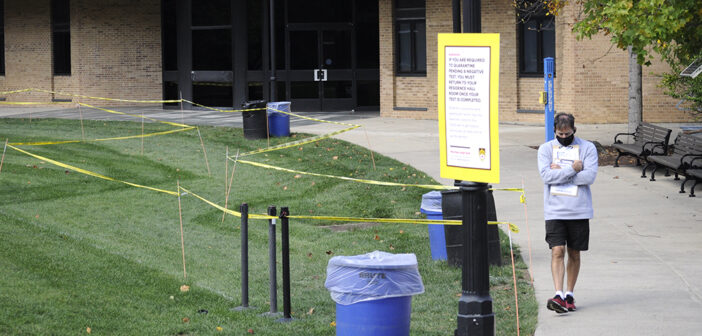As of publication, there are 30 positive COVID-19 cases among on-campus students, 25 students in isolation on-campus and 114 students in quarantine on-campus.
In total, there are 100 positive COVID-19 cases and 269 students in quarantine, according to Lehigh’s COVID-19 dashboard.
Positive cases on-campus, however, are of particular concern because of the close density of students in the residence halls — even with students living in single rooms.
Remie Lamkin, ‘24, is quarantining in her dorm room in House 87 after someone on her floor tested positive for coronavirus.
“Right now, everything on-campus is locked down,” Lamkin said. “Libraries are closed, dining halls are closed, all the places where you could hang out with people are closed. So even if you’re not in quarantine, you technically still are.”
Lamkin said she has only been able to leave her room to use the bathroom, but tries to interact with her friend from across the hall.
“We’ll leave our doors open to talk (from our rooms), but if I’m positive and she’s possibly negative, I wouldn’t want to infect her,” Lamkin said.
Lamkin said she was not told to quarantine until after someone on her floor received a positive test result. Lamkin said she was at an in-person class when she received notice that someone on her floor had tested positive.
A few days earlier, Lamkin found out that another student she was exposed to tested positive. After learning of her exposure, Lamkin called the Health Center to see if she could be tested for COVID-19. The Health Center told Lamkin she should see if the on-campus testing tent would administer her a test.
The on-campus testing tent then told Lamkin that only students who were selected through Lehigh’s surveillance program could receive a test. Lamkin was denied testing even though she had been exposed to someone with a positive test result.
Lamkin said the employees at the testing tent told her she would receive information within the next few days about testing.
While in quarantine, Lamkin was running low on one of her medications. She said she called the Health Center, as well as Psychological Services, to see if there was some way she could pick up her medication from the Mail Center or have it delivered to her dorm.
After not receiving a response from the Health Center, Lamkin’s mom drove to campus to deliver her daughter her medication.
Lehigh recently expanded its testing to include random weekly surveillance testing and the inclusion of fully remote students in its surveillance program. Provost Nathan Urban told The Brown and White in an Oct. 1 interview that he anticipated the need for additional testing once the initial round of mandatory surveillance testing for non-remote students subsided after the first two weeks of the semester.
“We originally paid for a number of tests that was larger than the initial batch of testing,” Urban said. “So we knew we would have to do additional testing over the course of the semester, but we wanted to make sure it was done intelligently, responsibly. So we anticipated we would have to do more tests but we didn’t know when and of whom. If cases were lower and declined, we might’ve waited to deploy those until spring.”
But that’s not what happened. Instead, cases have spiked in the past week.
Urban told The Brown and White on Oct. 1 — prior to the surge in on-campus cases — that such a spike would be worrisome.
“If we started to get significant numbers of cases in the dorms, because students are living close together, that would be something significant,” Urban said. “So we will continue to adjust the surveillance testing numbers and distribution based on what we’re seeing in terms of cases.”
Urban added that he doesn’t see the university’s testing plan as end-all be-all.
He said while testing is “helpful” and can help Lehigh “respond,” testing “in most cases” ends up “in some ways a little too late.”
“It’s hard to know (what would’ve happened if we tested everyone regularly),” Urban said. “Certainly there are many campuses where regular tests are being done that have had their own outbreaks.”
Cavan Reilly, ‘24, is quarantining in Drinker House after someone on his floor tested positive for coronavirus.
Aside from his initial email from Lehigh telling him to quarantine and get tested, Reilly has gotten no additional information about his situation.
He said he is unhappy with Lehigh’s communication so far.
“All my friends who were in close contact with me the day before all asked to get tested,” Reilly said. “And (the Health Center) said unless you have symptoms, you can’t (get tested). So they’re still roaming around outside.”
Reilly said the meals Lehigh provided have included roast beef, mashed potatoes, taco meat and butternut squash. He said the past four meals he’s had have all contained some form of butternut squash.
The Lehigh University Instagram account posted an Instagram story announcing that starting Oct. 4, the university will only be supplying meals to students in isolation. Quarantined students should use dining hall takeout options, the Instagram story said. Lamkin said she found out about this change from Instagram, not from any direct communication.
Reilly said while he is excited to be able to get fresh air, he doesn’t understand how the takeout method will fit into quarantine requirements.
“I don’t know how they are going to enforce us just going back and forth,” Reilly said.
Jess Levy ,’20, ‘21G, is a Gryphon for Upper Cents. She said while she understands her residents aren’t supposed to be visiting other residence halls this semester, they still may have been exposed by meeting a friend from a different residence hall for lunch or dinner.
“I have had some residents (express) dissatisfaction that they’re not being told where potential COVID cases are,” Levy said.
Levy understands that the Health Center needs to respect students’ privacy concerning health information, but she said if the university is not being open about where confirmed COVID cases are, you may not know if someone who lives on the floor below you tests positive.
She said the delay in the Health Centers’ awareness of a positive case due to their hours of operation causes lags in quarantining and isolating students, which can endanger more students.
“Gryphons may not know that a hall has been asked to quarantine,” Levy said. “So if you’re on duty and you don’t know that a hall is on quarantine, you may enter that hall unaware of the situation you’re putting yourself into. It’s always a shock when a student goes, ‘I was just told I’m in quarantine, what do I do?’ and you say, ‘Oh my goodness, I had no idea you were in quarantine.'”
Emma Weiss,‘24, has had a different experience living in Trembley, Lehigh’s COVID-19 isolation dorm. Weiss moved into a dorm in Trembley on Sept. 28 after being contact traced following exposure to someone who tested positive for COVID-19.
She said she began feeling symptoms Sept. 29 and received a rapid test from the Health Center on Oct. 1. She received her positive test result an hour later.
After Weiss tested positive and her two Trembely suitemates tested negative, she was told to relocate to her own room in Trembley.
“Lehigh called me and said we have another room for you in Trembley,” Weiss said. “But they never called to see if I actually moved out. I’m convinced that I could have stayed there the whole day and they wouldn’t have noticed that I left.”
Weiss was moved to her own suite with a kitchen, a lounge area and four bedrooms. She said she is checked on once a day when food is delivered, but other than that she said it has been lonely. Weiss said during the day she watches Netflix and FaceTimes friends to keep herself busy.
“I started and watched an entire season of a show in one day,” Weiss said.
While easier to occupy herself during the day, Weiss said the nights are more difficult.
“It was scary, being in such a big room with three empty beds,” Weiss said.
Gabrielle Falk and Jordan Wolman contributed to this report.






Comment policy
Comments posted to The Brown and White website are reviewed by a moderator before being approved. Incendiary speech or harassing language, including comments targeted at individuals, may be deemed unacceptable and not published. Spam and other soliciting will also be declined.
The Brown and White also reserves the right to not publish entirely anonymous comments.